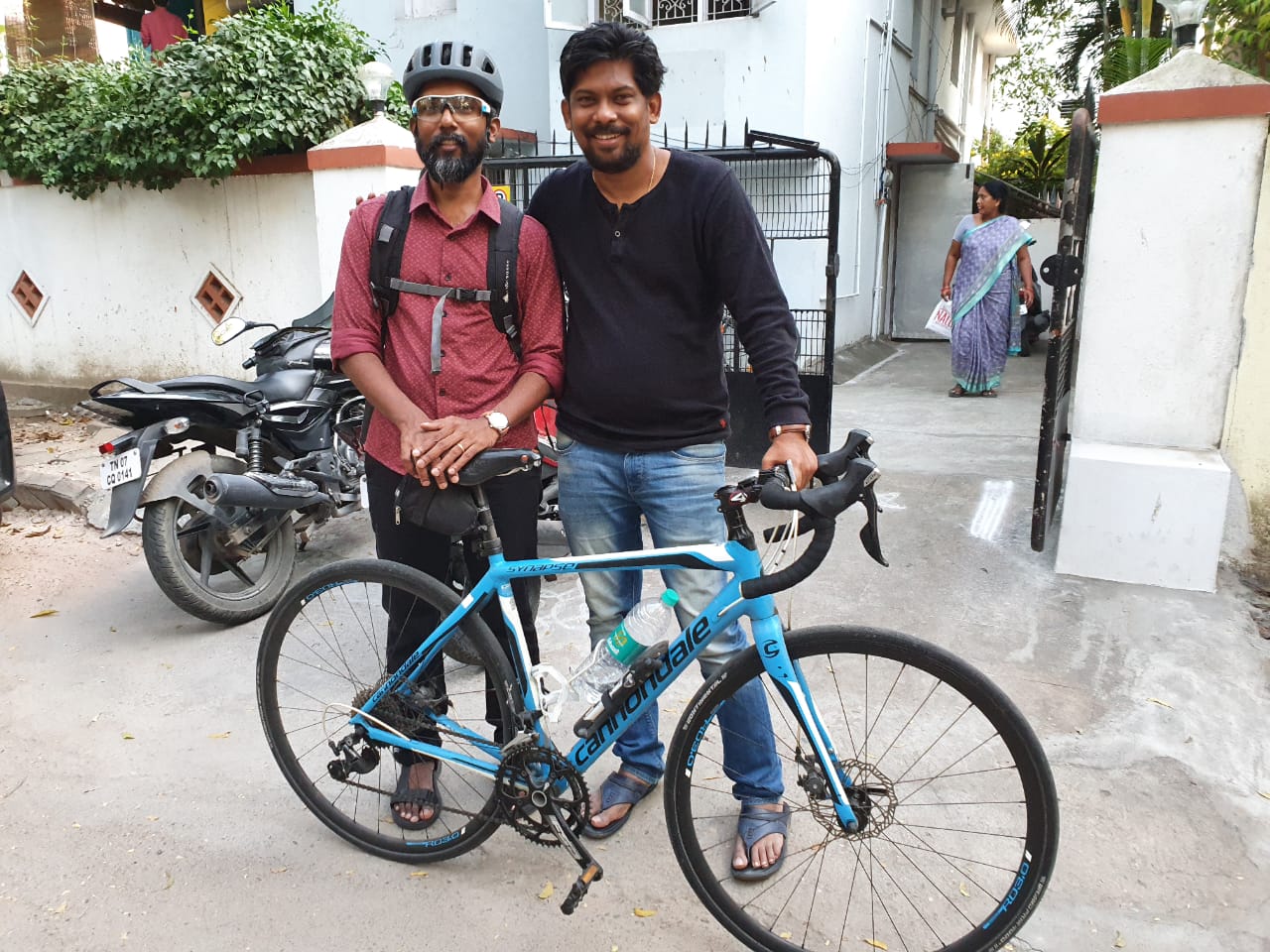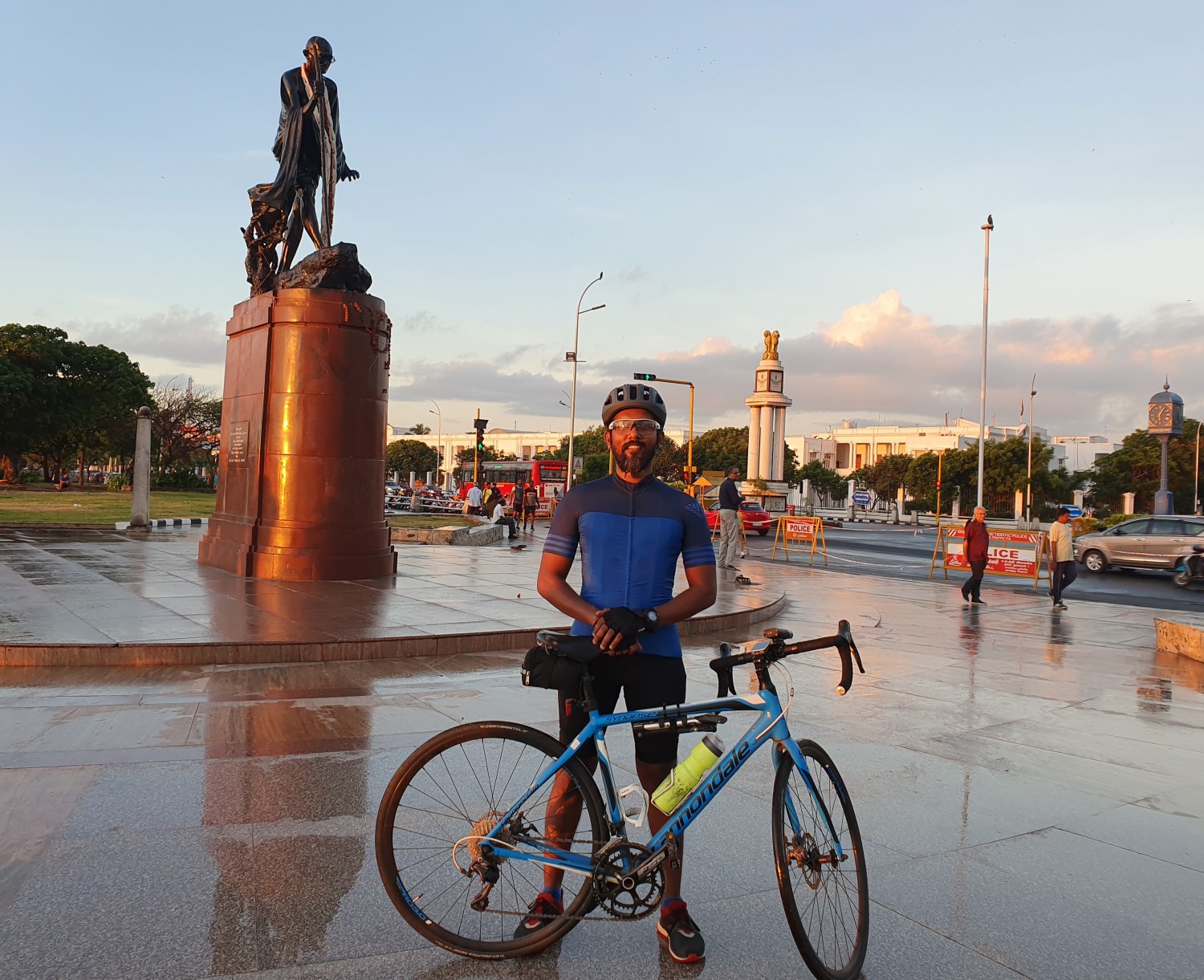We chat with Bicycle Mayor of Chennai, Felix John about the cycling infrastructure in the city and steps needed to improve conditions…
Bicycle Mayor of Chennai: Felix John
Bicycle Mayor? What’s that you wonder. Is it a city mayor who rides a bicycle to work? Unlikely, it would appear. Indian politicians aren’t known for being capable of placing their rather ample posterior on the tiny saddle of a cycle.
As Felix says, he doesn’t introduce himself as a Bicycle Mayor, he prefers calling himself a representative of cyclists of Chennai. It is easier for the listener to comprehend.
Besides chai, the favourite way of passing time in India is ridiculing the government. So it is best to make it abundantly clear, that you aren’t part of them, from the outset!
BYCS
BYCS is a Netherlands based organisation which is dedicated to the cause of cycling as a means of transport. They believe that “bicycles transform cities and cities transform the world“.
Fittingly BYCS is headquartered in Amsterdam, the cycling capital of the world!
The current target for the organisation is 50 by 30. Which is to get 50% of the urban population onto cycles by 2030.
To achieve this lofty goal, BYCS has a global program called, Bicycle Mayors.
We spoke to Bicycle Mayor Chennai, Felix John, to understand the needs of the city and how things can be turned around for the better.
Getting Here
Refreshingly, Felix started cycling as a commuter. Though not in Chennai. He had moved to Italy for studies and took to commuting by cycle there.
After returning to Chennai in 2013, he couldn’t summon the courage to ride on the city roads. A far cry from Europe which he had got habituated to.
It took him the better part of 3 years, before he could muster up the heart to go cycling again. But on this occasion, it wasn’t to commute, rather as a leisure activity to regain fitness.
At that point of time, he didn’t have a dream of changing the world on a cycle!
That came later when We are Chennai Cycling Group (WCCG) nominated Felix to apply for the Bicycle Mayor program for the city.
Now We Are Here, What Next!
Since Felix John has become the bicycle mayor of Chennai, he has worked towards raising awareness amongst the cycling community.
Even many seasoned cyclists aren’t ready to take up cycling as a solution to urban transportation. Amongst the cycling groups in Chennai it is less than 20% who are willing to use their bikes for commuting.
His first and foremost challenge is to get people already on bikes, to use it as a means of transportation.
Being a part of a group like BYCS, there is easy access to knowledge regarding bicycle infrastructure. It is his job to get that information to trickle down to cyclists and policy makers.
Ideas are shared amongst the 41 bicycle mayors currently in India. Plans and thoughts which are suitable for conditions in the Indian subcontinent.
In this day and age, social media is the information highway. And it is no different for Felix. But it isn’t a case of being a ‘keyboard warrior’, it is more to do with the fact that the ‘keyboard is mightier than the sword’!
He ensures that there is a steady stream of positive information and data being shared in mainstream media. It is a time taking process with no immediate results. Because it isn’t so much as educating people, as it is bringing a tangential shift in thought process. To get people to stop thinking about the cycle as a poor man’s vehicle and as a solution to a variety of problems.
Dealing with the REAL Mayors!
Felix works with the Institute of Transportation and Development Policy (ITDP) in Chennai to come up with solutions to improve the cycling infrastructure.
He has also attempted to work in unison with government officials and ministers. And that is equivalent to hitting your head against a brick wall.
The response from government departments is not just tepid, it is non-existent!
Felix knows it will take time and patience to work through the red tape. Which is why currently he focuses more on the cycling community, rather than the bureaucracy.
Global Commuter
One big advantage Felix has is that he has lived in Europe, which has a strong cycling culture. He has first hand experience and knows exactly what he is working towards.
Which is why he knows there is a world of difference between commuting by cycle in Italy and Chennai. The heat and humidity are one of the most common reasons for people to not commute by bike.
But the biggest difference he finds isn’t the cycling conditions. It is in fact the cycling culture.
People here look down at cycles. A cycling commuter who buys a motorcycle, is upgrading. Larger vehicles perceive cycles as a bother on the road, who shouldn’t impede their fast moving vehicle.
There is little respect meted out to cyclists and pedestrians. That thought process needs to change, which will take time.
Lockdown Effects
Many countries across the globe are encouraging cycling and walking for their citizens, by investing massively in relevant infrastructure. The people there have also taken to the idea, with cycle stores reporting booming sales.
On being asked if cycle stores in Chennai are seeing something similar, Felix laughed.
The only sales which spiralled during the lockdown was that of ‘indoor trainers’!
Enthusiasts and the community still perceives cycling as a sport only, not as a viable means of transportation. The lockdown hasn’t shaken up the established order at all.
Low Income Group Cyclists
There are fancy lycra clad cyclists on cool expensive bikes, and then there are people who have been commuting on cycles for decades without pretence.
The majority of this group aren’t cycling by choice. The moment an increase in income allows them, they purchase a motorised two-wheeler. In Chennai, it is the beloved TVS XL 50!
But how does one stem this tide of cyclists become motorists? The Bicycle Mayor of Chennai is stumped.
This is the hardest group to work with. The belief of upgrading to a motorcycle is too strong to be overturned. The only hope is that improved cycling infrastructure, will allow people to be happy and safe on bicycles for longer.
Whether the Weather Allows
In Chennai, the weather is the best excuse to look away from your bike.
And such are the people in focus for Felix. Cyclists who would like to cycle to work, but do not do so, for a plethora of reasons.
That’s where the expertise and community comes into play. Giving people useful tips and tricks on comfortably commuting goes a long way in getting them on the saddle.
Commute Bi Cycle, an initiative by WCCG has 5 chapters across the city and members tag along to ride2work. Somewhat like a carpool.
Cycling all alone can be intimidating initially and having a friend helps build confidence. Small steps which help turn the pedals of change.

To Helmet or Not
Amsterdam based BYCS has been lobbying for not making helmets compulsory for commuter cyclists in many countries of the world.
Since each situation is different, we asked for Felix’ opinion on the matter.
In Chennai, your traditional commuters, have been riding cycles for decades without a thought of wearing a helmet. Yet it is a grey area.
Felix, promotes the usage of helmet, but not making it compulsory.
While commuting, even a tiny incident can cause head injury and a helmet can save your life. So if someone can afford a helmet, he asks them to use it.
In crazy traffic like India, where motorcycles are often found speeding on cycle lanes, it is prudent to take as much precaution as possible. As such helmets are a smart idea!
Of course, that doesn’t mean, you can force someone who has been commuting for decades to suddenly start wearing a helmet! There’s a fine balance to be maintained.
Kids on Bikes
In the metro cities of India, an otherwise common sight is missing. Seeing schoolkids happily pedalling away is a rarity in a place like Chennai.
Felix says, one reason is that schools themselves do not want to promote the use of cycles amongst children. It is a matter of economics. Bicycles would make them independent and they wouldn’t require to use the paid bus services which private schools offer.
They sow the seed of doubt in children and parents alike, which is enough to stop them from heading out on a bike.
Since Felix can’t fight the might of big buck private schools, he intends to head in the opposite direction.
In Tamil Nadu, the state government has a scheme, which provides free cycles to school children in state run schools. Felix plans to work with these schools to get kids to ride their bikes and be independent.
It is after all the children of today who are the future of tomorrow.
Electric Cycles
Electric vehicles are often bandied about as the panacea for all global evils. The greener than green activists decry that, and are all for promoting electric bicycles as the future of mobility.
Felix isn’t quite convinced that electric cycles are the answer. He believes that once a person gets used to an electric cycle, where they can reach their destination without pedalling, they will upgrade. And that upgrade will more likely than not be to faster motorised two-wheelers rather than a bicycle.
Though he readily admits, E-Bikes could flow traffic in the opposite direction as well, with motorists getting back into cycling with the help of these battery operated pedal bikes.
He still feels the cost of it could be a major deterrent to genuine commuters. In India, the starting cost of an E-Bike is roughly 20000. A big chunk of money for many citizens of the country.
It can of course be targeted at the corporate employee. Who would like to take up a fitter lifestyle, considering the number of people who suffer from bad health at a young age.
Felix says, with India’s largest cycle manufacturer, pushing hard to promote E-Bikes in India, it might actually become popular.
Yet, he is not entirely convinced and is waiting and watching how the E-Bike scene unfolds in India.
The Future is Now…
Heading into unknown territory in the post-COVID world, there is hope for major changes in urban infrastructure.
Improving anything is a constant struggle and the Bicycle Mayor of Chennai, Felix John along with his 40 counterparts in India, hope to continuously better our country.
If you would like to know more about the BYCS program or help with changing Chennai, get in touch with Felix on Twitter, Facebook or Instagram!
If you would like to start commuting by your cycle in India safely, then read this!




Akhilesh Yadav, the former Chief Minister of U.P. was a cycling enthusiast. He set up the first cycle track from Etawah to Agra (about 200 kms). He also got cycle tracks demarcated in several major cities. However, as soon as he was out of office the cycle tracks just disappeared. Yadav may have had a political angle to his passion as his party’s symbol is the cycle.
I also feel that one should not so easily give up on school children. Principals can be approached to encourage students to cycle